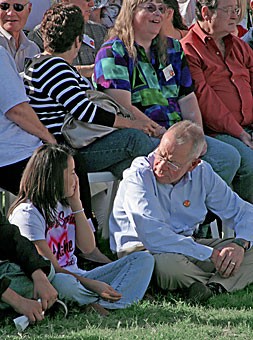Two years ago, then-26-year-old Melissa Madonna was diagnosed with cystic fibrosis.
Shortly after being diagnosed, her body started to deteriorate. She had her entire large intestine removed in October 2005.
Madonna said her lungs started to crash following the surgeries, and after a two-week stint on the lung transplant waiting list, she had a double lung transplant on Sept. 27.
Madonna was one of more than 100 people from all over the U.S. who gathered at the UMC Saturday to celebrate the medical team that saved their lives.
The 26th annual Cardiothoracic Transplant Patient Reunion was started in 1980 by a group of transplant patients who wanted to honor their medical team for giving them more years of quality life.
“”I feel a lot better now that I have had the surgery,”” Madonna said. “”My outlook on life is different. Now I am not a workaholic anymore and my priorities have all changed. My advice to young people is to not smoke and eat your enzymes.””
Martha Moutray, a social worker with the cardiothoracic transplant program at UMC, said patients feel a strong connection to their transplant center for life if they continue living in the area.
“”This gathering happens so people that have been through this similar unique experience can meet each other,”” said Moutray.
Dr. Jack Copeland, associate director of the Sarver Heart Center and a professor of surgery, performed Arizona’s first transplant on Norman “”Dutch”” Tarr in March of 1979, according to a press release. Tarr lived for four years after the surgery.
Since then, UMC has performed 773 heart transplants, 54 heart-lung transplants, 50 single-lung transplants and 53 double-lung transplants.
UMC has one of the highest transplant survival rates in the country, according to UMC’s Web site.
Carrie Coykendall, a recent UA graduate, said she volunteers at UMC with patients who are on artificial heart devices while waiting for a heart transplant.
“”It is really encouraging and exciting to come here and meet people who have made it through that process and are doing really well years after their transplant”” said Coykendall.
Bill Wohl, a Scottsdale resident, is one of the 70 patients who were part of an experiment that helped get FDA approval for the CardioWest artificial heart.
UMC surgeons implanted the artificial heart in September 1999.
After 159 days with an artificial heart, Wohl received a heart from a 36-year-old stunt man from Hollywood who died filming a TV show in February 2000.
“”Before, I was a fat, old businessman with a wife and two kids living in a mansion up in the mountains,”” Wohl said. “”In 2002, I started the ‘Donate Life – Be an Organ Donor’ license plates. In November of 2007, we are going to have our first Donate Life walk in Tempe. Those are two of the things I am most proud of.””
Since having a heart transplant, Wohl has competed across the globe in cycling, swimming and track.
Last year Wohl came in 44th place overall in the annual El Tour de Tucson – this year, he is hoping to be in the top 25.
“”UA and UMC saved my life, there is absolutely no other way to describe it,”” Wohl said. “”My doctor told me that I am on my 30th life. Out of all his years at UMC, I was their worst cardiac patient. My outlook on life has changed tremendously.””
Dr. Richard G. Smith, the director of the Artificial Heart Program at UMC, said that in the early 1990s, there were no devices available for small children.
In 2000, Smith said he helped to bring in the Berlin Heart from Germany. The small device has an 80 percent success rate in children. However, the artificial heart has to be ordered and flown in from Germany.
Smith said he hopes by next year, the device will be readily available and stocked at the UMC.
Another device Smith has been persistent in trying to get FDA approval for is the portable artificial heart.
Artificial hearts are available, but the patient is confined to the hospital when he or she has it. A portable version of the artificial heart has been created and is a success, Smith said.
Smith hopes by next year the FDA will approve the portable artificial heart and surgeons can start using it on patients at UMC.









